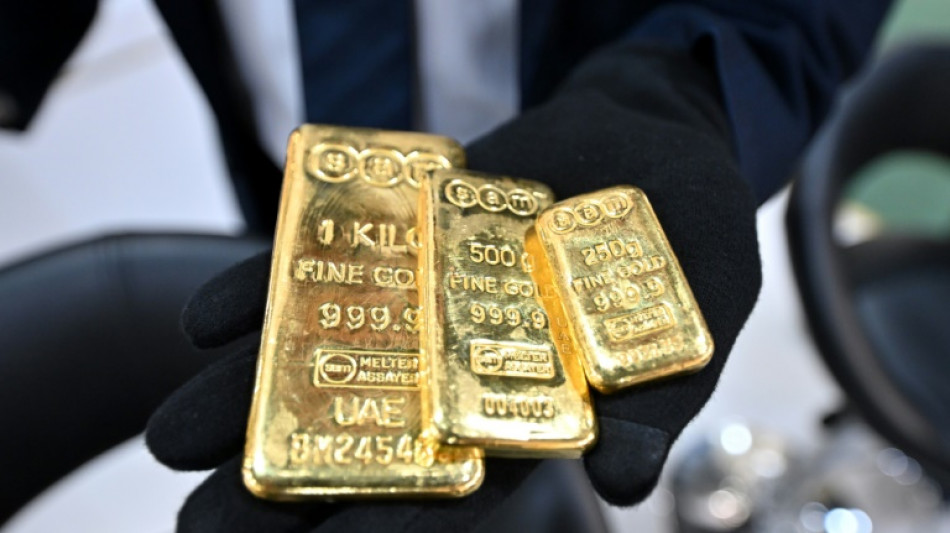

Swiss gold refining sector hits US tariff mine
The first casualty of the imposition of a hefty 39-percent tariff on Swiss imports into the United States may be gold refining after it emerged certain gold bars would face the levy.
The price of gold on the US futures market hit a record high Friday after US customs authorities clarified that gold bars weighing either one kilogram or 100 ounces (2.8 kilograms) are subject to so-called reciprocal tariffs.
The July 31 clarification was first reported late Thursday by The Financial Times.
One-kilo gold bars are the most traded type of bullion on Comex -- the world's biggest futures market -- and Switzerland is a major supplier of the bars on the physical market.
Expectations had been widespread in Switzerland that gold bars would be classified under a different customs code that excludes them from President Donald Trump's sweeping "reciprocal" levies that went into effect on Thursday.
Swiss officials travelled to Washington this week in a bid to reach a deal similar to the European Union, whose products now face a 15-percent rate, but came back empty handed.
The news increased pressure on the Swiss government as gold trading weighs heavily on its trade balance.
John Plassard, head of investment strategy at Cite Gestion, said Switzerland was naive to believe gold would be spared from US tariffs.
Some of the gold refining business would likely flow to other gold industry centres such as Antwerp, he said, as the good reputation of Swiss refineries probably would not be enough to offset the 39-percent tariff.
Gold bars produced in the Belgian city Antwerp face the 15-percent tariff applied to the European Union when imported into the United States.
- Refining powerhouse -
Switzerland is home to four of the world's largest gold refineries, the largest being Valcambi in Balerna, in the Italian-speaking part of the country.
They import unrefined gold coming from mines, recycled jewellery or lower-purity bars to be recast into high-quality bars, making Switzerland a hub for the global gold trade.
These bars are then reintroduced to the market for jewellery, watchmaking, industry and tech products, as well as the banking sector and central bank reserves.
- More than a third of global refining -
According to a report by the Swiss Federal Customs Administration, the country imported 2,372 tonnes of gold in 2023 and re-exported 1,564 tonnes.
The value of these exports approached 88 billion Swiss francs ($109 billion at current rates), with the main buyers being China at 25.1 billion francs and India at 13.1 billion francs.
Including other precious metals, such as silver and palladium, the sector accounts for 1,500 direct jobs in the country and 1,000 indirect jobs, according to the Swiss association of manufacturers and traders of precious metals.
In 2023, Switzerland accounted for 34 percent of the total refined gold worldwide, according to the State Secretariat for Economic Affairs (SECO).
- Export surge to the United States -
Swiss gold exports to the United States soared to 11 billion Swiss francs last year, nearly doubling from 6.1 billion in 2023.
They then skyrocketed in the first half of 2025, reaching 39.2 billion francs, compared to nearly 1.7 billion in the first half of 2024, according to data Swiss customs provided to AFP.
Nearly all of the gold -- 37.6 billion francs' worth -- was exported in the first quarter of 2025. Shipments then plummeted sharply to roughly 1.6 billion francs in the second quarter.
Swiss President Karin Keller-Sutter on Thursday strongly disagreed with how Trump assessed the US trade deficit with Switzerland, and thus the high tariff imposed.
She said the rise in gold exports in 2024 had led to the increase in the deficit.
On Tuesday, Swiss newspaper Le Temps noted that to calculate customs duties on Switzerland "the White House seems to have relied exclusively on 2024 data," which was "an atypical year" due "to Donald Trump himself".
Swiss gold exports to the United States skyrocketed in November, when Trump won the presidential election, triggering a surge in "safe haven" investments such as gold, it said.
S.Pillai--MT




